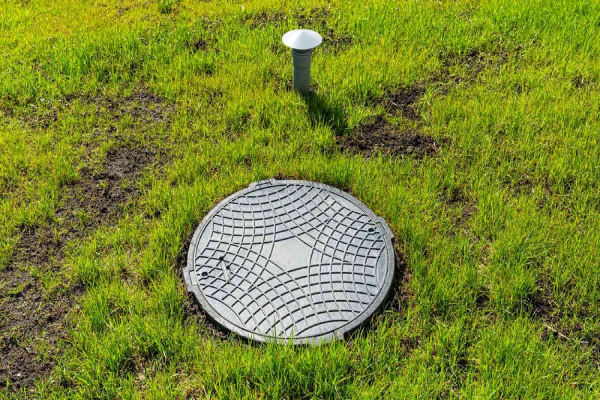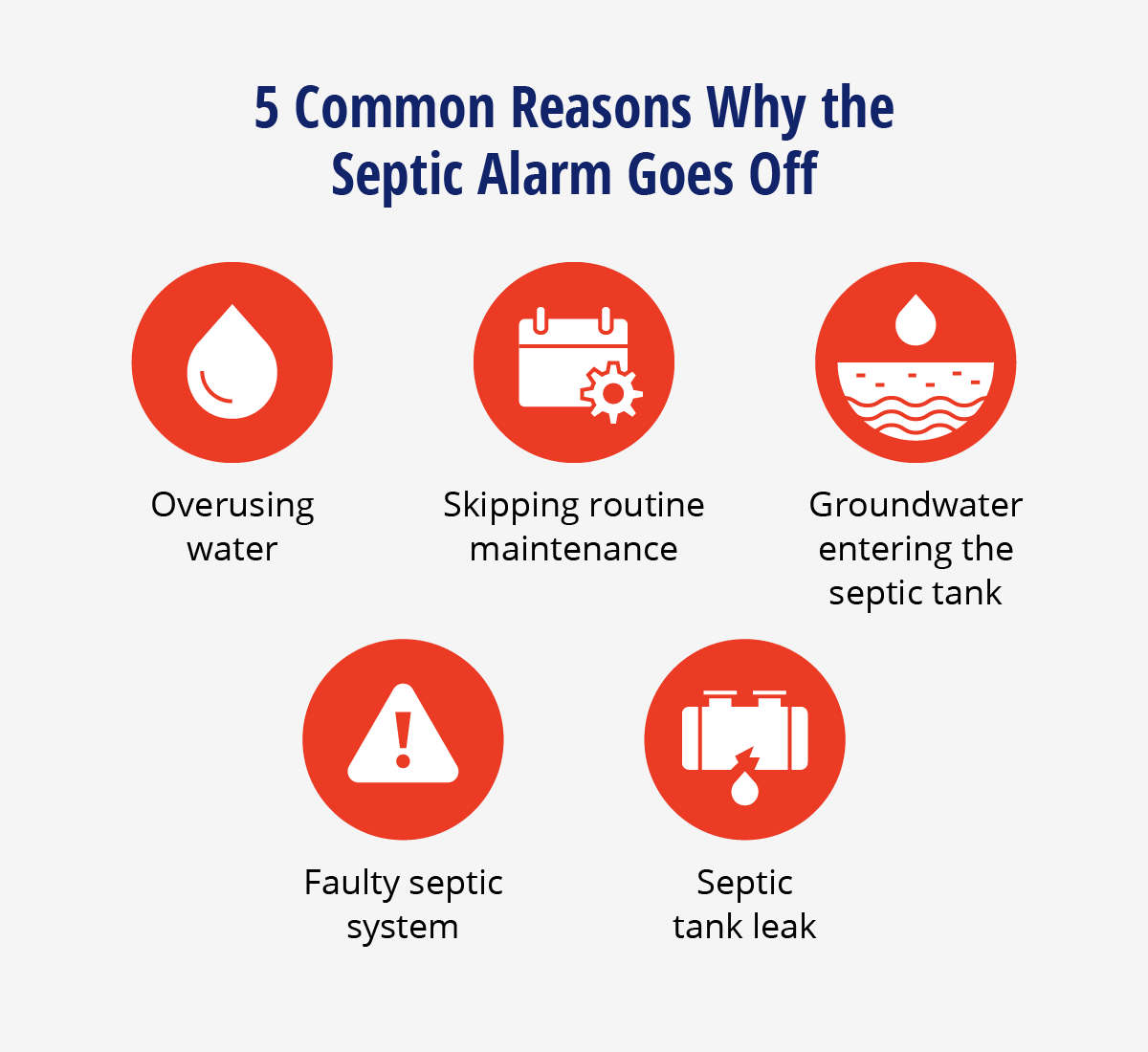
According to Rainbow Restoration, a septic alarm signals potential issues with your septic system that require prompt attention.
|
Any alarm is no joke, but when a septic alarm goes off, action needs to be taken as soon as possible.
When a septic alarm goes off and the system is left unchecked, it could create a very expensive and potentially dangerous problem.
If the alarm is due to a biohazard disaster or other emergency, disaster recovery services can mitigate the effects of sewage and water damage and prepare the area for full restoration.
Table of contents:
- Why Is the Septic Tank Alarm Going Off?
- What To Do If Septic Alarm Is Going Off
- How Does a Septic System Work?
- What Happens During a Septic System Failure
- Tips for Avoiding a Septic System Disaster
- Trust Rainbow Restoration® for Water Damage Restoration
- Septic Alarm FAQ
Why Is the Septic Tank Alarm Going Off?
A septic tank alarm is designed to sound when the system is failing or if there’s too much or too little water in the tank. This alarm doesn’t mean a disaster is imminent, but it’s good to understand what set it off and why.
Septic tank alarm troubleshooting should always be done by a professional, especially if a cause can’t be determined quickly.
1. Too much water usage
Septic systems are designed with equilibrium in mind. Each system is built to contain a certain amount of waste products, water, and bacteria to help break down waste. If the water level in a tank gets too low, the system doesn’t function as well. The high water alarm in septic systems sound when water usage increases past the point of maintaining balance in the system.
2. Lack of routine maintenance
The most common cause of a septic alarm is a lack of routine maintenance. Septic tanks need to be cleaned and recharged periodically, and the components of the pumps and alarms need to be replaced to keep them functioning correctly. If one part of the system breaks down, others might not be far behind. If it's been too long since the septic system was cleaned or checked, that might cause the alarm to go off.
3. Groundwater in the system
If a septic tank alarm is going off after heavy rain, it could mean groundwater is seeping into the system and raising the water level. The alarm is designed to go off when this happens and could mean the system will equalize itself after the rain has stopped.
Should a light rain set the alarm off, call a professional to examine the system, because it could mean the tank is damaged and letting in a dangerous amount of water.
4. Faulty septic system
When a septic alarm is going off repeatedly or a septic alarm is going off but there’s no red light, it could mean there’s a problem with one or more components of the septic system. Some of these components could be parts of the alarm and might not mean the system is failing, but others could be integral parts needed for the system to work correctly. Contact an expert to have them check the system thoroughly.
5. Septic tank leak
Some septic tank leaks are obvious. There may be a strong sewage smell in the drain field, a bloom of algae in nearby water sources, or drains may back up. Other leaks are less obvious, especially if the tank is in an area that doesn’t get much precipitation. But if the alarm is going off and there hasn’t been rain and water usage hasn’t spiked, it could be a sign of a leak.

What To Do If Septic Tank Alarm Is Going Off
While it’s easy to panic when a septic tank alarm sounds, the following steps can help determine the cause and whether a septic system expert should be called in.
1. Check the light
Most septic alarms feature a light. When the system is functioning correctly, the light will be green. If the light is red, it usually means the water level is too high. This could be caused by frequent laundry cycles, shower water running for extended periods, or it could mean that heavy rain has permeated the tank.
2. Turn the alarm off
Turn the alarm off using the button or switch on the alarm box. With the alarm off, check the rest of the system. If the alarm keeps turning on, it’s a sign that some part of the system is damaged.
3. Check the septic breaker
After turning off the alarm, check the drain field for standing water. If there is standing water, it could mean that the tank has overflowed or leaked. This might be because of a physical problem with the tank or because the system doesn’t have power.
Check the circuit breaker that supplies power to the septic system. If power isn’t getting to the system, the pump won’t work, which can lead to a backup of sewage in the basement or other parts of the building. Try flipping the breaker and running several pump cycles.
4. Call a plumber
If standing water is present or the red light doesn’t turn off after 10 hours, call a plumber or septic tank service provider. They can help identify and fix any problem, whether it's a damaged component, a leak, or the amount of water in the system.
Continuing to run the system or trying to fix it alone could make the problem worse and cause problems inside the building and the surrounding areas.
5. Call a restoration company
After the plumber has solved the underlying problem that caused the alarm to go off, contact a water damage restoration company, such as Rainbow Restoration, to professionally dry the property.
If sewage is backed up into the interior of a property, sewage cleanup professionals can remove dangerous biohazards to ensure occupant safety.
How Does a Septic System Work?
A septic system treats the waste from a home or business with special bacteria before discharging some of the treated water into a nearby area called a drain field.
- Water and waste are flushed out of a building and into a holding tank.
- In the tank, liquids and solids separate.
- Bacteria in the tank break down certain kinds of waste, turning it into liquid.
- The treated water is flushed out to a drain field where the water is absorbed into the soil.
Some septic systems use multiple tanks to further treat wastewater before discharging it.

What Happens During a Septic System Failure
A septic system fails when the waste in the septic tank ends up somewhere other than the tank without being treated. This might mean that the drains in the building back up with sewage or it could mean that the drain field is flooded with waste.
Either result could mean real problems for the property. These waste products can cause health problems for people and animals and contaminate the soil, groundwater, and other bodies of water.
Tips for Avoiding a Septic System Disaster
Preventing standing water in a basement isn’t always possible, but some steps can help prevent a major septic system disaster from damaging the property, including:
- Install a sump pump in the basement or crawl space: A sump pump can help remove some excess water caused by a backup.
- Use septic-safe products in the home: Make sure toilet paper, soaps, and cleaning products are designed for use in the septic system.
- Have the system inspected regularly: Regular inspections can help plumbers take care of aging or damaged systems before they become real problems.
- Reduce the strain on the system: Stay within recommended usage limits to keep the system from having too much or too little water.
- Think twice before pouring everything down the drain: Cooking oil and certain paper and hygiene products can’t be broken down in septic systems. Know what to send down the drain and what to throw away.
- Know who to call when a septic alarm goes off: A trusted plumber or septic tank service should be called when the alarm goes off, followed by a restoration company to help reduce water damage to commercial properties and residences.
Trust Rainbow Restoration for Water Damage Restoration
If there is water damage to be mitigated or restored, contact the service professionals at Rainbow Restoration. Additionally, Rainbow Restoration provides residential and commercial sewage cleanup services that can reduce the impact of septic system failures.
This article is intended for general informational purposes only and may not be applicable to every situation. You are responsible for determining the proper course of action for your home and property. Rainbow Restoration is not responsible for any damages that occur as a result of this blog content or your actions. For the most accurate guidance, contact the Rainbow Restoration location nearest you for a comprehensive, on-site assessment.
Septic Alarm FAQ
As an industry leader we believe setting the highest standards in water, fire, and mold damage restoration requires a continuous focus and dedication to education and improvement. This commitment to exceptional service also includes using our experience and expertise to answer your restoration questions.
Here are answers to some of the most frequently asked questions about septic alarms.
How do I reset a septic tank alarm?
To reset a septic tank alarm, start by pressing the button on the alarm box. Some boxes may have a switch instead of a button. If that doesn’t turn the alarm off, try disconnecting the system from power, reconnecting it, and then cycling the system. When in doubt, call a professional for help.
Can rain cause a septic alarm to go off?
Yes, heavy rain can trigger a septic alarm. If rain saturates the drain field too quickly, it can leak into the tank and raise the level to the point where the alarm triggers.

